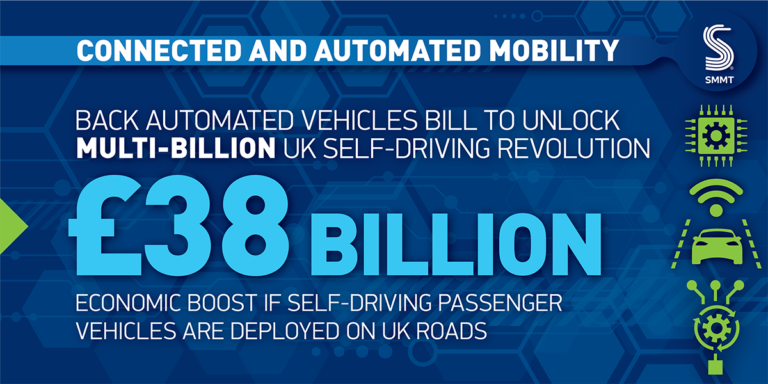UK politicians are being urged by the country’s automotive sector to back the Automated Vehicles (AV) Bill and ensure its swift passage into law so the UK can unlock the safety and economic benefits of self-driving passenger cars and public transportation services. The SMMT points to its own research that suggests self-driving technology – and the reduction in human error it would bring – could save an additional 3,200 lives and prevent 53,000 serious accidents, from now until 2040, and provide a £38bn (US$48bn) economic boost for the taking with the rollout of self-driving vehicles – but only if the AV Bill is enacted without delay.
Even if the current timetable is met, following the bill’s second reading in the House of Commons in early March, we are unlikely to see self-driving vehicles on British roads until at least 2026. But should the legislation be delayed until after the general election, that date is likely to be nearer to 2030, putting the UK at a significant disadvantage. Rival markets in the EU and USA already have regulatory frameworks in place and have captured the lead, deploying the tech on public roads now – thus making the need for our own legislation even more urgent.
While the UK has firm foundations, thanks to government and industry jointly investing more than £600m (US$765m) in self-driving vehicle trials since 2015, the SMMT says there is a risk that the UK could yet squander its advantages. This would be a great shame, given the UK’s Department of Transport has found that UK consumers are often more enthusiastic about new technology than many in Europe, with government research also revealing that public interest in self-driving technology increases once consumers learn more about it.
Speaking at SMMT Connected 2024 (March 14), an automotive event in London exploring the future of personal mobility and mass transportation, Mike Hawes, SMMT chief executive, said, “Backing the AV Bill now is fundamental if Britain is to not only develop but deploy self-driving passenger cars and services. We have the foundations, but other major markets are stealing a march, with regulation already in place allowing them to benefit from UK-developed self-driving tech that cannot be rolled out here. Any further delay risks leaving Britain in the slow lane, jeopardizing our competitiveness and holding back the significant safety and economic rewards self-driving technology can deliver.”
Exclusive YouGov research commissioned by the Society of Motor Manufacturers and Traders (SMMT) found that nearly a third of adults (29%) would use an automated bus, shuttle or taxi service if available today, with one in four (26%) likely to try self-driving features in a personal car – even though they have yet to experience the technology.
The poll also found that young people are even keener, with Generation Z (18-27 year-olds) almost twice (34%) as likely to try a personal car with self-driving features than Baby Boomers (18%) (60-78 year-olds).
Reduced stress of driving, safer journeys and potentially lower insurance costs were listed as the top three benefits of a self-driving car. For self-driving passenger services such as a bus, shuttle or taxi, consumers were most motivated by the prospect of lower fares, better availability in rural areas and safer journeys.
Existing technologies such as Adaptive Cruise Control and Park Assist, the most popular advanced driver assistance systems (ADAS) among survey respondents, are already making our roads safer. Advanced emergency braking (AEB) technology, for example, is now available on eight-in-10 new cars and has led to a 38% reduction in real-world rear-end crashes. With some nine-in-10 road collisions caused by driver error, the potential of new fully automated features to reduce the risk of accidents and casualties on Britain’s roads is self-evident, according to the SMMT.
About SMMT and the UK automotive industry
The Society of Motor Manufacturers and Traders (SMMT) is one of the largest and most influential trade associations in the UK. It supports the interests of the UK automotive industry at home and abroad, promoting the industry to government, stakeholders and the media.
The automotive industry is a vital part of the UK economy and integral to supporting the delivery of the agendas for levelling up, net zero, advancing global Britain, and the plan for growth. Automotive-related manufacturing contributes £78bn (US$99bn) turnover and £16bn (US$20bn) value added to the UK economy, and typically invests around £3bn (US$3.8bn) each year in R&D. With more than 208,000 people employed in automotive manufacturing, and some 800,000 in total across the wider sector, the industry trades globally, with exports worth £94bn (US$119bn) accounting for 10% of all UK goods exports.


